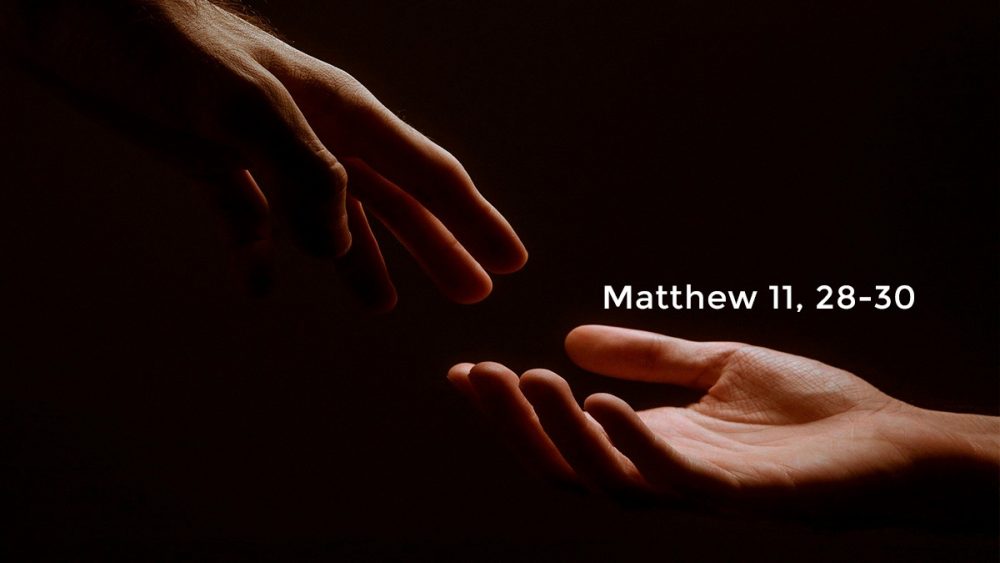Fr Paolo Consonni, MCCJ
14th Sunday in Ordinary Time – Year A
“Come to me, all you that are weary and are carrying heavy burdens, and I will give you rest” (Mt 11:28)
The summer break is starting, but many people, myself included, are experiencing a great paradox. On the one hand, we are very tired because of our stressful lifestyle, which is full of commitments. On the other hand, we don’t know how to make good use of our free time. We either waste it, scrolling on our smartphones, or we try to evade our problems by engaging in exciting activities or behaviours to indulge ourselves, only to find out that we are back at square one when we return. Escapism has very limited efficacy in recovering and restoring our tired minds and bodies.
Nobody can deny the importance of regularly taking a break: spending some time doing physical activity, possibly in contact with nature, enjoying some get-togethers with friends and having good food, and to take a breath from worries and anxiety. These activities are indispensable for our physical and psychological health.
But the concept of “rest,” deeply rooted in the Bible, also has spiritual connotations which need to be considered. God rested on the seventh day after creating the universe, symbolizing the fact that creation was an act of free will: a gift, not a “must-do” job. The Ten Commandments even made resting on the Sabbath a requirement. Having been slaves in Egypt, the people of Israel painfully understood the importance of resting: to be permanently and forcibly on duty is a cruelty no one should ever experience again!
As a consequence, the biblical concept of rest, far from being simply a vacation, became interconnected with upholding the dignity and the sacredness of human life. These values were consequently absorbed in the celebration of the Lord’s Day, the Christian Sabbath, the day we celebrate Christ’s Resurrection.
In the section about the Third Commandment, the holiness of the Sabbath, the Catechism of the Catholic Church teaches that “God’s action is the model for human action. If God ‘rested and was refreshed’ on the seventh day, man too ought to ‘rest’ and should let others, especially the poor, ‘be refreshed.’ The sabbath brings everyday work to a halt and provides a respite. It is a day of protest against the servitude of work and the worship of money” (2172). Later, it affirms: “Human life has a rhythm of work and rest. The institution of the Lord’s Day helps everyone enjoy adequate rest and leisure to cultivate their familial, cultural, social, and religious lives” (2184). And again: “Those Christians who have leisure should be mindful of their brethren who have the same needs and the same rights, yet cannot rest from work because of poverty and misery. Sunday is traditionally consecrated by Christian piety to good works and humble service of the sick, the infirm, and the elderly. Christians will also sanctify Sunday by devoting time and care to their families and relatives, often difficult to do on other days of the week. Sunday is a time for reflection, silence, cultivation of the mind, and meditation which furthers the growth of the Christian interior life” (2186).
The Scriptures especially emphasize the link between resting and worship: “The sabbath is for the Lord, holy and set apart for the praise of God, his work of creation, and his saving actions on behalf of Israel” (CCC 2171). Worship is the highest form of human activity because it recognizes that God’s grace is the source and the end of our life, and what sustains it. To worship God during our time of rest is not another “activity” among others, but an act of faith through which we remind ourselves that God, not ourselves or our work, is in control of our existence. When we have performed our duties, then we are invited to trust that God is taking care of us and that His providence goes well beyond our problem-solving capabilities and the many mistakes we make in the process. Only when we uphold the primacy of God’s love and mercy over our lives, manifested by Christ, can we truly find rest.
In the past centuries, the slaves in the USA found solace by singing Gospel songs, strongly influenced by their ancestral African traditional rhythms and music. The biblical content of those songs uplifted their spirit, created solidarity, and strengthened their desire for freedom. They sang during their time of rest and worship but also during their forced labor, because, while singing, they felt precious and worthy in God’s eyes.
As Catholics, we experience the essence of the biblical concept of rest in the Eucharist. Christ – present in the Words of the Scriptures and the breaking of the bread– gives us the strength we need to face our life, enlighten our darkness, console our loneliness, and heal our wounds… and He sends us back to our daily lives renewed and with a clear sense of direction. May the Eucharist become the blueprint upon which to plan our summer vacation!


 Follow
Follow


